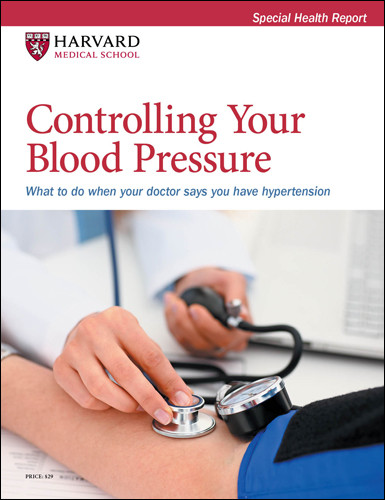White-coat hypertension: A cause for concern?
Blood pressure that's high in the doctor's office but normal at home should be taken seriously.
- Reviewed by Christopher P. Cannon, MD, Editor in Chief, Harvard Heart Letter; Editorial Advisory Board Member, Harvard Health Publishing

Named for the white coats traditionally worn by doctors, white-coat hypertension refers to blood pressure that's high only when measured in a health care setting. These blood pressure spikes are presumed to be triggered by anxiety and stress. But are they just harmless blips—or something more concerning?
According to a 2024 review in Current Hypertension Reports, white-coat hypertension is linked to a small but definite increase in heart-related risks. People with white-coat syndrome (as it is also known) are also prone to develop full-time high blood pressure, defined as a reading of 130/80 millimeters of mercury (mm Hg) or higher.
Diagnosing white-coat hypertension requires people to check their blood pressure outside of the doctor's office. One option is ambulatory blood pressure monitoring, which uses a device that automatically measures and records blood pressure every 15 to 30 minutes over a 24-hour period. Another is using a home blood pressure monitor, which Dr. Randall Zusman, a cardiologist at Harvard-affiliated Massachusetts General Hospital, recommends for all his patients.
"Everyone's blood pressure fluctuates constantly throughout the day, so checking it at different times, ideally over a week or two, provides a more accurate assessment of your blood pressure," says Dr. Zusman. For more on the benefits of home blood pressure monitoring, see "Can you self-titrate your blood pressure drugs?" in the September 2024 Heart Letter.
Risks of white-coat syndrome
White-coat hypertension is defined as a reading in the doctor's office of greater than 130/80 (but less than 160/100) and an average daytime blood pressure reading of less than 130/80. So, if home monitoring reveals mostly normal blood pressure readings, you may not need treatment. But if you capture some strikingly high readings, these intermittent spikes might still be damaging your cardiovascular system, even if your daily average is less than 130/80, says Dr. Zusman.
In 2019, a large study found that people with untreated white-coat hypertension face a greater threat of heart disease than people whose blood pressure readings are always normal. However, people who were taking blood pressure medication but whose blood pressure still rose at the doctor's office (a phenomenon known as the white-coat effect) did not have a higher risk of heart disease.
Who warrants a closer look?
Doctors don't always agree about who should be checked for white-coat hypertension. As far as treatment goes, lifestyle changes are vital for anyone with an elevated office blood pressure reading, says Dr. Zusman (see "5 natural ways to lower blood pressure"). For people who are overweight and mostly sedentary, fully committing to those changes may be all they need to reach and maintain a healthy blood pressure. But for people with diabetes, high cholesterol, and other factors that put them at risk for a heart attack or stroke, doctors usually recommend starting blood pressure medication right away.
If someone is reluctant to take medication, Dr. Zusman often does a heart ultrasound (echocardiogram). The test can reveal possible thickening of heart's main pumping chamber (left ventricle) — a telltale sign of damage from high blood pressure. "This testing isn't specifically endorsed by guidelines. But I find the information helpful when discussing the implications of intermittent hypertension and trying to determine the possible need for drug therapy," says Dr. Zusman.
5 natural ways to lower blood pressureLose weight. If you're overweight, every pound you lose could lower your systolic blood pressure by up to one point. Shun salt. Steer clear of foods high in sodium, especially the "salty six:" breads and rolls, cold cuts and cured meats, pizza, chicken dishes, soup, and sandwiches. Get moving. Aim for 30 minutes of aerobic exercise (the type that raises your heart rate) at least five days per week. Two weekly sessions of strength training also help. Cut back on alcohol. Even just one drink per day can raise blood pressure over time. Increasingly, experts are advising people to limit alcohol to special occasions or to avoid it altogether. Tame your stress. Relaxation techniques such as deep breathing and meditation may help tamp down the body's stress response, which contributes to high blood pressure. |
Image: © PeopleImages/Getty Images
About the Author

Julie Corliss, Executive Editor, Harvard Heart Letter
About the Reviewer

Christopher P. Cannon, MD, Editor in Chief, Harvard Heart Letter; Editorial Advisory Board Member, Harvard Health Publishing
Disclaimer:
As a service to our readers, Harvard Health Publishing provides access to our library of archived content. Please note the date of last review or update on all articles.
No content on this site, regardless of date, should ever be used as a substitute for direct medical advice from your doctor or other qualified clinician.
















